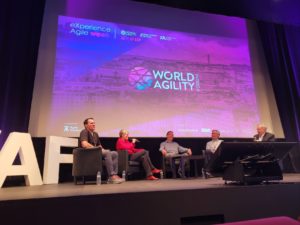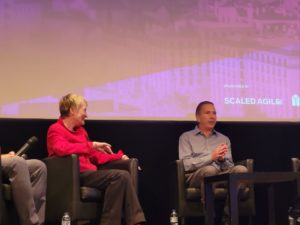
We took the Valize team on the road to attend this exclusive, high-level event. Here are a few snippets.
You can negotiate with a terrorist!
Ivar Jacobson was referring to the tendency for inventors of tools and methods to want to keep them proprietary. What this creates is confusion as similar tools doing similar things compete with one another, creating confusion. This comment was made during Day 2 of the World Agility Forum, when Jacobson was announcing a new initiative to make frameworks readily available. What he was getting at is the insistence that many have that their methodology is the One Best Way, when in fact there are many ways of getting to a final destination – it doesn’t all have to be one.
Jacobson and his colleague are setting up a system for practitioners of agile methods to share what works and put it into practice, which they call open source agility.
If you think innovation is risky, try stagnation!
This comment from my colleague Darrell Rigby (of Bain) captures the essence of what he and GE’s Kevin Nolan discussed with respect to the resurgence of GE Appliances (under the ownership of the Chinese innovator Haier), using innovation to completely rethink how the brand is built.
Nolan described how he and his colleagues created an innovation incubator called FirstBuild, inspired by the experiences of makers working on passion projects of their own. He recalled visiting such a lab in his hometown of Louisville, only to find a couple of GE engineers there who flinched when they saw him turn up. “Wait a minute,” he recalls thinking. “These guys are putting up with their time with me, only to turn right around and go to “work’ at this other place because they are finding it more interesting. What is wrong with this picture?”
FirstBuild was an outgrowth of a moment (well, several actually) of desperation for GE. The appliance division had been up for sale for some time and in the aftermath of the 2008 Great Recession, nobody wanted to buy it. As Nolan said, “it’s bad enough that your parent company wants to get rid of you, but when they couldn’t even succeed at that, that is really depressing. The new strategy for GE appliances involved a Haier philosophy they call “zero distance between the company and its customers.”
Among the innovations Nolan discussed at the conference was the Opal, a machine that makes so-called “nugget ice” for people who like to chew on ice cubes (as he said, “who knew people wanted to chew on ice cubes??”). FirstBuild is one answer to the question of how you can develop innovations in a radically different way than is conventionally done in large corporations. One unusual feature of the experiment is that FirstBuild makers take their innovations all the way through to product launch, rather than transitioning them to a market-facing operation as is more conventionally done.
Reinventing capitalism for a digital age
I’ve been a huge fan of Carlota Perez’s work for ages – and I’m not alone. Her book “Technological Revolutions and Financial Capital: The Dynamics of Bubbles and Golden Ages” has just been named one of the books of the century by Foreign Affairs.
For those that don’t know Perez’s theory of economic development, essentially, she posits regularities in how capitalist systems make progress. Investment capital, she argues, goes into hot new technologies that have the promise to upend the existing system. This creates a bubble. The promise of the new technologies, however, is not realized until the bubble bursts, forcing investment capital to become production capital. I’m giving this very short shrift – see a great overview article here.
The thing is, Perez warns us, is that we don’t necessarily get a Golden Age just because of a technological revolution. To obtain that, we need to design it. As she puts it, “World Development is at a crossroads. We can either go to a gilded age of finance that continues to promote uneven deployment and social unrest, wars, or you can have a golden age in which production capital and investment capital are integrated, leading to sustainable growth and world-wide prosperity.”
As she puts it, we have to make smart decisions about several key issues. If we are to obtain the benefits of all our ingeniousness, we need to move toward a context that is smart, green, fair and global, she argues. This requires
- The institutional equivalent of Bretton Woods (which set the stage for post World War II prosperity);
- A far-reaching change in the economic context to support “green” growth (a suggestion also made by Rebecca Henderson in her book “Reimagining Capitalism”) which we discuss in this Friday Fireside Chat.
- A radically new consensus on the respective roles of business, government, and society
- Convergence in investment between private and public funds
- Reversing social inequality
Among other ideas, Perez suggests that we consider implementing a universal basic income – without qualifications or demonstration of need. As she argues, those who make enough not to need it will give back the excess in taxes, while those who do need it will likely spend it – creating demand and potentially new growth. Better wages for service workers would also help – creating the reality of better lives and greater demand.
While I don’t have access to a recording of this talk, you can watch Carlota tackle similar subjects at this link.
Meanwhile, at Valize
We took advantage of the whole team’s being in Lisbon to get better organized about what we’re offering. In the next six months or so, expect to see big progress on our software for educators and smaller firms, the graduation of our second cohort of on-line learners and a bunch more tools, such as our on-line team effectiveness diagnostic. And if you are new to our learning modules, consider taking the free preview course.


